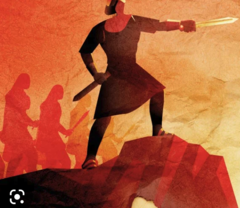Chanukah - Were the Maccabees Right Wing Extremists?
12/11/2022 11:49:44 AM

Yes, that is the buzz. The Maccabees were a bunch of religious fundamentalist wack a doodles. That's the claim and here's the background... it's 250 BCE.
Under the rule of the Syrian Greeks, the blessings of Greek civilization had at last made it to Judea. Science, drama, sports, art, music, politics -- all of the things that culture has come to mean.
And according to the Book of Maccabees, we Jews were pretty excited about the whole thing. They even opened a gymnasium -- which combined sports with classes in poetry, music, public speaking and law -- right in sight of the Beit HaMikdash, the Holy Temple.
Only a few diehards resisted. A loose coalition of some of the Priestly clans led by the Hasmoneans (Maccabees) along with scribes and some of the common people of the land, objected to the compromises that Hellenism (Greek Civilization) demanded: public meetings to conduct municipal business on Shabbat, the acts of "civil religion" such as offerings to the Greek gods that accompanied virtually every public function, and of course, worship of the emperor as an avatar of Zeus. This was seen not so much as religious but as simple patriotism and loyalty.
And then there were those who tried to hide the Covenant of Circumcision -- sports were practiced naked by then. And those who forsook Torah learning for secular studies. Greek language to the exclusion of Hebrew and Greek values: equating goodness with beauty, barbaric practices like exposing unwanted infants, and practices like orgies and the brutality of many combat sports, brought many into open opposition.
So when the emperor was reported killed while fighting with rivals down in Egypt, the diehards revolted and went after the leadership who had joined the Hellenist camp. They tried to purge Jerusalem of Greek idols, shut down the coliseum that the Hellenizers had built and removed the naked workouts.
The king wasn't dead. But he was mad. Entering Jerusalem under the guise of friendship and dialogue, he massacred those who opposed Hellenism and made the practice of traditional Judaism punishable by death: no circumcision, no Jewish calendar, no study of the Torah.
That did it. From adopting certain Greek practices and working on a way to integrate tradition with change, the Jewish people had to choose. And the majority chose loyalty. Loyalty to the Torah, to Jewish values and to Jewish peoplehood.
Have you ever heard of Gadius, Thasius, Avaran, Apphus? Nice Greek names, right? You might know them by other names: Eliezer, Shimon, Yonatan, Yochanon, the sons of Matithias whom we call the Maccabees. They all had Greek names. Only Judah himself used only his Hebrew name.
And their kids had Greek names too: Menelaus, Aristobulus, Antigonus, Hyrcanus. They weren't religious fanatics. They were ready to learn from other cultures and adopt practices and areas of study and culture that made sense to them.
What they weren't ready to do was to give up the unique identity as Jews and the unique practices of Judaism.
Jewish European Enlightenment writer Heinrich Heine back in the 19th century saw converting as "the only entry ticket to European civilization." He came to regret what he had done. But even now, so often, the price of blending in, of being included, of taking part in the features and fun of modern American life is the same choice faced by the Maccabees. Religion is not about dividing people but about affirming your own unique identity, history, culture and commitments.
Someone dear to me once told me that the definition of a Jewish religious fanatic was someone who let Jewish considerations determine their choices. I disagreed then and I disagree now. Jewish choices do not stop us from being ourselves. There are many ways to express and to live being Jewish and making being Jewish a priority does not make you a fanatic. What it does make you is connected to a heritage and a destiny whose purpose is to set an example and bring blessing to the world.
When we light those little candles, we are showing the world, a world that seems to grow more savage and darker by the day, that there is an undying light, kindled by the will, sustained by memory and by love. That is a light worth lighting.
Chag Sameach!
